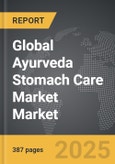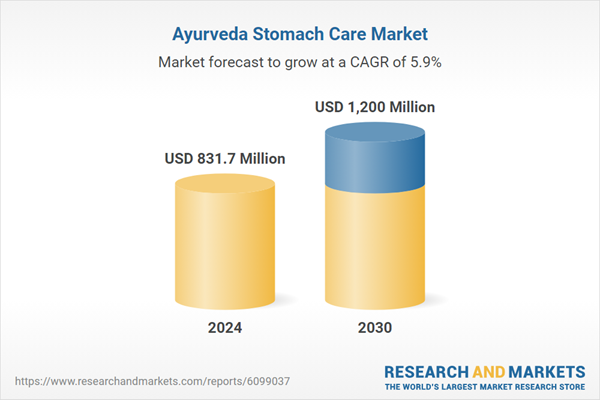Global Ayurveda Stomach Care Market - Key Trends & Drivers Summarized
Why Is Ayurveda Gaining Prominence in Stomach Health Management Across Traditional and Modern Wellness Systems?
Ayurveda-based stomach care is witnessing renewed global attention as consumers increasingly seek natural, preventive, and holistic solutions to manage common gastrointestinal (GI) disorders such as indigestion, bloating, acidity, constipation, and irritable bowel syndrome (IBS). Rooted in centuries-old formulations, Ayurvedic remedies emphasize balancing digestive fire (Agni), detoxification, and the use of botanicals like triphala, ajwain, ginger, and licorice, which are known to support gut health, regulate metabolism, and soothe inflammation without the side effects typically associated with synthetic antacids or laxatives.This resurgence is aligned with the broader shift toward integrative health, where traditional medicine is being embraced alongside modern diagnostics and treatment frameworks. The global rise in GI distress linked to sedentary lifestyles, poor diets, stress, and antibiotic overuse is prompting consumers to explore Ayurveda as a preventive and restorative alternative. As wellness brands and health-conscious consumers align around plant-based, chemical-free formulations, Ayurveda stomach care products are being rebranded from legacy remedies to modern gut-health essentials - repositioning the category within the global functional wellness ecosystem.
How Are Product Innovation, Regulatory Recognition, and E-Commerce Expansion Driving Market Momentum?
Product innovation in the Ayurveda stomach care segment is being driven by modern formulation science, user-friendly delivery formats, and clinically validated botanical blends. Brands are developing capsules, effervescent tablets, ready-to-drink tonics, and herbal infusions that combine convenience with therapeutic efficacy. Proprietary blends integrating traditional herbs with contemporary supplements - like prebiotics, enzymes, or probiotics - are expanding appeal among wellness-oriented consumers seeking synergistic gut health support.Regulatory recognition of Ayurveda under traditional medicine frameworks in countries like India, Sri Lanka, Nepal, and parts of Europe, as well as broader acceptance through wellness licensing in North America and Australia, is improving credibility and market access. This is complemented by government-backed initiatives - such as India's Ministry of AYUSH and WHO's Traditional Medicine Strategy - supporting global adoption. Digital distribution via direct-to-consumer (DTC) channels and wellness-focused e-commerce platforms has further enabled Ayurvedic brands to reach global audiences, supported by influencer-driven marketing, subscription models, and storytelling around ancient wellness traditions.
Where Is Demand for Ayurveda Stomach Care Rising and Which Consumer Segments Are Driving Growth?
Demand for Ayurveda stomach care is rising in both traditional and emerging health markets. India remains the dominant market due to deep cultural integration and a mature domestic supply chain of herbs and Ayurvedic practitioners. However, international demand is accelerating in North America, Europe, Southeast Asia, and the Middle East, where consumers are becoming more open to traditional medicine and alternative therapies, particularly in the context of chronic gut issues and lifestyle-induced digestive disorders.Key consumer segments include urban millennials and Gen Z users focused on preventive wellness, professionals with high-stress lifestyles, older adults managing chronic digestive issues, and health-conscious women seeking hormone-gut balance solutions. The “food as medicine” trend, clean-label preferences, and rising interest in gut-brain axis health are also drawing new users to the category. Fitness enthusiasts, biohackers, and plant-based lifestyle followers are contributing to crossover adoption from mainstream supplement categories into Ayurvedic stomach care formulations.
What Is Fueling the Global Growth of the Ayurveda Stomach Care Market?
The global growth of the Ayurveda stomach care market is being fueled by consumer demand for gentle, sustainable, and holistic digestive health solutions that align with wellness values. The pandemic-induced awareness of immunity and gut health, coupled with concerns over long-term pharmaceutical dependence, has propelled interest in time-tested herbal alternatives. Rising disposable incomes, health literacy, and demand for natural remedies in urban and aging populations are further amplifying the sector's appeal.Investment in R&D, transparent sourcing, and clinical validation are strengthening Ayurveda's global competitiveness, while strategic collaborations between Ayurvedic firms and nutraceutical or FMCG companies are enabling wider distribution and branding reach. As Ayurveda stomach care transitions from niche herbal remedy to mainstream wellness product, a key question now shapes the market outlook: Can Ayurveda-based digestive solutions evolve in formulation sophistication, scientific validation, and global positioning to meet the demands of a modern, microbiome-aware, and performance-driven health consumer base?
Report Scope
The report analyzes the Ayurveda Stomach Care market, presented in terms of market value (US$). The analysis covers the key segments and geographic regions outlined below:- Segments: Product Type (Digestive Supplements, Digestive Tea, Ayurvedic Medicines, Probiotic Supplements, Other Product Types); Application (Constipation, Cyclic Vomiting Syndrome, Indigestion, Diarrhea, Other Applications); End-Use (Ayurvedic Pharmacies, Specialty Ayurvedic Clinics, Online Pharmacies).
- Geographic Regions/Countries: World; United States; Canada; Japan; China; Europe (France; Germany; Italy; United Kingdom; Spain; Russia; and Rest of Europe); Asia-Pacific (Australia; India; South Korea; and Rest of Asia-Pacific); Latin America (Argentina; Brazil; Mexico; and Rest of Latin America); Middle East (Iran; Israel; Saudi Arabia; United Arab Emirates; and Rest of Middle East); and Africa.
Key Insights:
- Market Growth: Understand the significant growth trajectory of the Digestive Supplements segment, which is expected to reach US$482.4 Million by 2030 with a CAGR of a 6.2%. The Digestive Tea segment is also set to grow at 4.4% CAGR over the analysis period.
- Regional Analysis: Gain insights into the U.S. market, valued at $226.6 Million in 2024, and China, forecasted to grow at an impressive 9.4% CAGR to reach $239.1 Million by 2030. Discover growth trends in other key regions, including Japan, Canada, Germany, and the Asia-Pacific.
Why You Should Buy This Report:
- Detailed Market Analysis: Access a thorough analysis of the Global Ayurveda Stomach Care Market, covering all major geographic regions and market segments.
- Competitive Insights: Get an overview of the competitive landscape, including the market presence of major players across different geographies.
- Future Trends and Drivers: Understand the key trends and drivers shaping the future of the Global Ayurveda Stomach Care Market.
- Actionable Insights: Benefit from actionable insights that can help you identify new revenue opportunities and make strategic business decisions.
Key Questions Answered:
- How is the Global Ayurveda Stomach Care Market expected to evolve by 2030?
- What are the main drivers and restraints affecting the market?
- Which market segments will grow the most over the forecast period?
- How will market shares for different regions and segments change by 2030?
- Who are the leading players in the market, and what are their prospects?
Report Features:
- Comprehensive Market Data: Independent analysis of annual sales and market forecasts in US$ Million from 2024 to 2030.
- In-Depth Regional Analysis: Detailed insights into key markets, including the U.S., China, Japan, Canada, Europe, Asia-Pacific, Latin America, Middle East, and Africa.
- Company Profiles: Coverage of players such as AIG Aerospace, Allianz Global Corporate & Specialty, American Financial Group Inc., Aon plc, Arthur J. Gallagher & Co. and more.
- Complimentary Updates: Receive free report updates for one year to keep you informed of the latest market developments.
Some of the 42 companies featured in this Ayurveda Stomach Care market report include:
- Adyant Ayurveda
- Agrow Ayurveda
- Arya Vaidya Sala
- Baidyanath Group
- Dabur India Ltd.
- Dr. Wakde’s Natural Health Clinic
- Hamdard Laboratories
- Himalaya Wellness Company
- Kapiva Ayurveda
- LifeChart Ayurveda
- Maharishi Ayurveda Products International
- Patanjali Ayurved Ltd.
- Polycare Herbals
- Sahajanand Life Sciences Ltd.
- Sri Sri Tattva
- Sukh Veda Wellness Center
- Taza Ayurveda
- Vaidban Ayurved Bhawan
- Vaidyaratnam Oushadhasala
- Zandu Ayurveda (Emami Ltd.)
This edition integrates the latest global trade and economic shifts into comprehensive market analysis. Key updates include:
- Tariff and Trade Impact: Insights into global tariff negotiations across 180+ countries, with analysis of supply chain turbulence, sourcing disruptions, and geographic realignment. Special focus on 2025 as a pivotal year for trade tensions, including updated perspectives on the Trump-era tariffs.
- Adjusted Forecasts and Analytics: Revised global and regional market forecasts through 2030, incorporating tariff effects, economic uncertainty, and structural changes in globalization. Includes historical analysis from 2015 to 2023.
- Strategic Market Dynamics: Evaluation of revised market prospects, regional outlooks, and key economic indicators such as population and urbanization trends.
- Innovation & Technology Trends: Latest developments in product and process innovation, emerging technologies, and key industry drivers shaping the competitive landscape.
- Competitive Intelligence: Updated global market share estimates for 2025, competitive positioning of major players (Strong/Active/Niche/Trivial), and refined focus on leading global brands and core players.
- Expert Insight & Commentary: Strategic analysis from economists, trade experts, and domain specialists to contextualize market shifts and identify emerging opportunities.
Table of Contents
Companies Mentioned (Partial List)
A selection of companies mentioned in this report includes, but is not limited to:
- Adyant Ayurveda
- Agrow Ayurveda
- Arya Vaidya Sala
- Baidyanath Group
- Dabur India Ltd.
- Dr. Wakde’s Natural Health Clinic
- Hamdard Laboratories
- Himalaya Wellness Company
- Kapiva Ayurveda
- LifeChart Ayurveda
- Maharishi Ayurveda Products International
- Patanjali Ayurved Ltd.
- Polycare Herbals
- Sahajanand Life Sciences Ltd.
- Sri Sri Tattva
- Sukh Veda Wellness Center
- Taza Ayurveda
- Vaidban Ayurved Bhawan
- Vaidyaratnam Oushadhasala
- Zandu Ayurveda (Emami Ltd.)
Table Information
| Report Attribute | Details |
|---|---|
| No. of Pages | 387 |
| Published | February 2026 |
| Forecast Period | 2024 - 2030 |
| Estimated Market Value ( USD | $ 831.7 Million |
| Forecasted Market Value ( USD | $ 1200 Million |
| Compound Annual Growth Rate | 5.9% |
| Regions Covered | Global |









